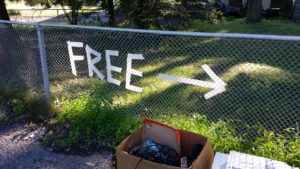by Anthony Signorelli
One of the causalities of the digital economy is the sense and value of ownership. In the digital world, it is decreasingly common to buy and own a thing. We subscribe to software, download free content, or use apps at little or no cost. There is no disk in a box, no piece of hardware sitting on your desk, no title to register with the state. Disks, hardware, and registration are all artifacts of ownership; software, downloads, and apps are not. The latter three derive their importance from a world in which ownership, i.e., our sense of private property, is undergoing a massive shift and challenging the very foundation of capitalism.
The Digital Disruption
 Capitalism cannot handle digital products. Such products have no marginal cost of production and they are infinitely available. No matter how many downloads, there can always be another one. With products of this type, the capitalist law of supply and demand, which is a mathematical ratio, cannot work. If supply is infinite, the price can always be zero. And, in fact, if left to the marketplace, that is exactly what happens—the prices of digital products collapse.
Capitalism cannot handle digital products. Such products have no marginal cost of production and they are infinitely available. No matter how many downloads, there can always be another one. With products of this type, the capitalist law of supply and demand, which is a mathematical ratio, cannot work. If supply is infinite, the price can always be zero. And, in fact, if left to the marketplace, that is exactly what happens—the prices of digital products collapse.
This collapsing price can be a joy for consumers because we can obtain value for free. But it comes with a corrosive power against one of the pillars of modernity—we get value but we own nothing. In modern capitalism, value is made through ownership. As a business, you own land or the means of production in order to produce things of value. As a consumer, you own a home, own your car, own your books and music, own your computer, in order to possess things of value and grow their value. Because ownership is so central to the economy, nearly all of our laws are oriented around the preservation of capital—i.e., keeping what we own.
The digital world, however, severs this relationship. Value and ownership are no longer intrinsically intertwined as the dominant ethic of economic well being. That severance opens two distinct possibilities—either we figure out how to create an economy in which most things are free (keeping ownership but redefining value), or the economy becomes dominated by rent relationships (retaining value through price but eliminating participation in ownership), with scarcity being created by limiting access to the digital products people need. The reality, I suspect, will involve a blend of the two.
The Possibility of Free
In a fully digitalized economy, the possibility of an economy based on free seems theoretically real. Automation, roboticization, and artificial intelligence eliminate most jobs. Nearly all products and needs of life are, in one way or another, digitalized. Production, rather than being separated into distant factories, moves closer and closer to the market, until it joins the market at the point of consumption—usually the individual family’s home. People produce all the energy they need at their home through solar conversion, and that energy manifests new forms from largely digital sources—the main input is energy. Products, including food, are created on demand by 3D printers (or similar technology), no one is coerced into work, creative pursuits dominate life, and people prosper.
Getting to that utopic view could be very difficult indeed; just ask the musicians and the authors, whose products are among the first to become totally digitized, about how they make a living selling their products. The truth is, most of them can’t. They make a living by doing live shows instead.
In this case, the connection between ownership and value is severed because the digital product—copies of books and music—is free. Another copy can always be accessed and downloaded, so there is no need to own it. So long as this phenomena is limited to a couple of industries, it is not a big deal. However, as more products digitalize completely, and as the portion of products that is digital increases and diffuses through society, we will begin to seriously question the value of owning things. We will question it because, in fact, there is no value in being able to say that the music is “mine.” It won’t matter. It is out there, and if someone takes “yours,” you can just download another.
The corrosive nature of this thought process to capitalism cannot be understated. In many ways, capitalism is built on the very idea of private property ownership. Capital, after all, is what you own, and capitalism is the system that defines your ownership and defends it. How can such a system be sustained if ownership is not valued? Or worse, how can it be sustained if the concept of ownership becomes meaningless? The obvious answer is that it cannot be, and that will likely be the decisive point. Capitalism cannot survive without the underlying principle of private property ownership.
The rise of the free economy is one possibility. It would probably begin with the provision of universal basic income because no one will be able to make money and the capitalist will need people to have money to buy their products. But over time, money would become increasingly useless as everything becomes free and abundant anyway. The only way to stave this utopic noncapitalism off is to create an artificial scarcity, the topic to which I turn now.
The Rental Economy—Manufacturing Artificial Scarcity

In order to defend capital, capitalism must create scarcity. Physical products always have intrinsic scarcity because they are subject to the cost of reproduction. As long as we are talking primarily about physical products, scarcity is assumed, and one can assert so-called “laws” like supply-and-demand. As we already discussed, digital products don’t have intrinsic scarcity—zero marginal cost of production means that there is no limit on supply, and that allows the price to collapse. So, capitalism has found another way to produce scarcity—the restriction of access.
Many years ago, digital capitalists were running into the same problem musicians and authors were—their digital product was obeying economic law instead of the artificial law of intellectual property. Software costs nothing to download, while the companies were charging enormous prices for their products. They were trying to create artificial scarcity through intellectual property, but it didn’t work. People made free copies anyway, and some of those people made them and sold them at half the price the companies charged.
The rise of the internet changed all this. The internet is the medium for trading and transmitting digits. In the early stages, it borrowed the capitalist model and basically used the internet as a delivery medium for digital products. But as broadband became more ubiquitous, a new reality emerged. People could stay connected to the internet for long periods of time, and access digital products over these connections. Digital capitalists saw this as the opportunity: Scarcity could be re-asserted through the restriction of access. And hence was born the subscription, or digital rent, economy.
From one angle, the rent-based economy is a kind of perverted version of capitalism. Basically, everything is owned by a very small number of people and everyone else pays rent to access those things. Its spread will be based on the fact that people see no value in owning these things, and instead perceive an improved value in the rental situation. So long as all we do is use these things, the rental economy could replace our current model. However, one cannot rent what one must consume. You don’t rent food, or wine, or wood for your fire, or worms for your fishhook. You consume them. You obtain them, you eat or consume them, and then they are gone. It is likely that vestiges of capitalistic ownership will remain in this area.
Nonetheless, if products can be produced digitally and abundantly, it is likely that the means to produce them can be rented. For example, a 3D printer (or similar machine) might one day be able to produce that which we consume—the clothing that wears out, the food that we eat, or maybe even the wood for that fire. In that case, rents, subscriptions, and access fees could become the dominant features of the economy.
As a matter of fact, the subscription—also known as membership, continuity, and sustainability business models—is very much on the leading edge of innovative business today. Businesses of all kinds are searching for ways to “subscriptionize”, and not all of them are digital businesses. Theaters are moving from individual show tickets to unlimited seating and viewing for subscribers. Dentists are moving routine cleanings and fillings into monthly subscriptions. Coffee house loyalty cards are turning into prepaid memberships and you get free coffee. These brick and mortar examples take their cue from the digital realm, and thereby demonstrate a growing diffusion of the subscription/rent model.
Why Not to Worry
I view the so-called rentist future as a kind of dystopic perversion of the postcapitalist opportunity. Should it arise, it could last a long time. However, as the means of production spread, abundant supply will too. A machine in your home that can create one or two pairs of shoes at no marginal cost of production can also produce ten. Capitalists will try to charge rent plus unit production costs, but the market will not support that for long. Costs will continue down, and as they do, the free economy will continue to emerge.
The second reason the free economy still appears to be an inevitable eventuality is that as prices collapse, so will paying jobs. Even the capitalists will figure out that if you can’t get your price, you can’t pay your people. And if the jobs disappear, that further reinforces the free economy—thereby undercutting nearly all the economic laws we thought were immutable.
Capitalism is built on the principle of private property and the value of ownership, both of which are based on the core principle of scarcity. Scarcity means that if there is one thing, only one of us can own it. Abundance, however, operates on a different principle—no matter how much air I breathe, there isn’t less for you. You can still breathe. Speaking digitally, if I have a copy of the book or music, you can too. If I access software, you can too. Ownership not only has no value, it is nonsensical. Capitalism and private property will not die easily, but they will die inevitably because they must. Their ideas and sensibilities cannot serve or organize the new digital world which we are entering now.